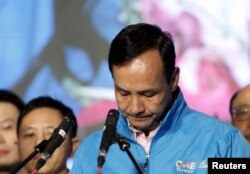Taiwan’s voters elected Tsai Ing-wen Saturday as the island’s first female president, delivering a crushing defeat to the Nationalist Party (KMT), which has focused heavily on growing relations with China since coming to power eight years ago.
Her independence-leaning Democratic Progressive Party also won a majority in the legislature for the first time, a development that could have a big impact on economic policies with China.
Speaking with the press shortly after her KMT opponent, Eric Chu, conceded defeat, Tsai pledged to maintain peace with the world’s second largest economy and maintain stable relations with Beijing.
Respect needed
Saturday’s victory for Tsai was the biggest landslide since Taiwan began holding direct presidential elections. Tsai says the vote was a statement of the will of the Taiwanese people as a “democratic country.”
“Our democratic system, national identity, international space must be respected, any forms of suppression will harm the stability of cross-strait relations,” Tsai said.
China considers self-ruled Taiwan to be part of its (China's) territory and has threatened to use military force against the island if it ever sought formal independence.
Shortly after the results were announced, China’s Taiwan Affairs Office, which is tasked with managing relations with Taipei, said it would continue to oppose any Taiwan independence activities.
A statement published by the state-run Xinhua news agency said China’s determination to protect its territory was “hard as rock.”
Following a civil war in 1949, the Nationalist Party fled to Taiwan, where much like the Communist Party on the mainland, it ruled with an iron fist for decades.
But unlike China, Taiwan eventually allowed multi-party politics and democratized, holding its first democratic elections in 1996.
Tsai will assume office on May 20 and the new legislature will hold its first session in early February.
US congratulation
Washington congratulated Tsai and her party on the victory shortly after the results was announced.
“We also congratulate the people of Taiwan for once again demonstrating the strength of their robust democratic system,” according to a State Department statement. “We share with the people of Taiwan a profound interest in the continuation of cross-Strait peace and stability.”
Rise from ashes
The KMT’s candidate, Chu, said he will resign as head of the party and has apologized for its loss in the elections.
"We've lost," Chu said in speech just hours after polls closed. "The KMT has suffered an election defeat. We haven't worked hard enough and we failed voters' expectations."
Chu pledged that the party would learn from its historic loss and rise again from the ashes.
Chu’s party not only lost the presidency by three million votes, but also lost 24 seats in the legislature.
Challenges ahead
Dealing with the island’s biggest trading partner, China, and helping strengthen a faltering economy and wage stagnation — particularly for young workers — are some of the challenges Tsai will face in office and a key concern among voters.
Speaking with VOA shortly after he cast his ballot on Saturday, elderly voter Lin Hsi–tsai said he was hopeful that Tsai can help turn Taiwan around and address the problems the island is facing.
“Look at how expensive real estate is these days. Do you really think that younger people can afford to buy a home?” he said.
The KMT, which has been in power for eight years now in Taiwan and has always held a majority in the legislature has strengthened economic links with China.
The closer ties have boosted the island’s tourism industry, but have also raised concerns about over-reliance on the world’s second largest economy, which is seeing its slowest growth in more than a quarter of century.
China has not said much about the vote, but has said it will not work with any candidate who does not support the "one China" principle.
Taiwan and China split following a civil war in 1949. But Beijing still regards it as a breakaway province that will someday be unified with the mainland.






